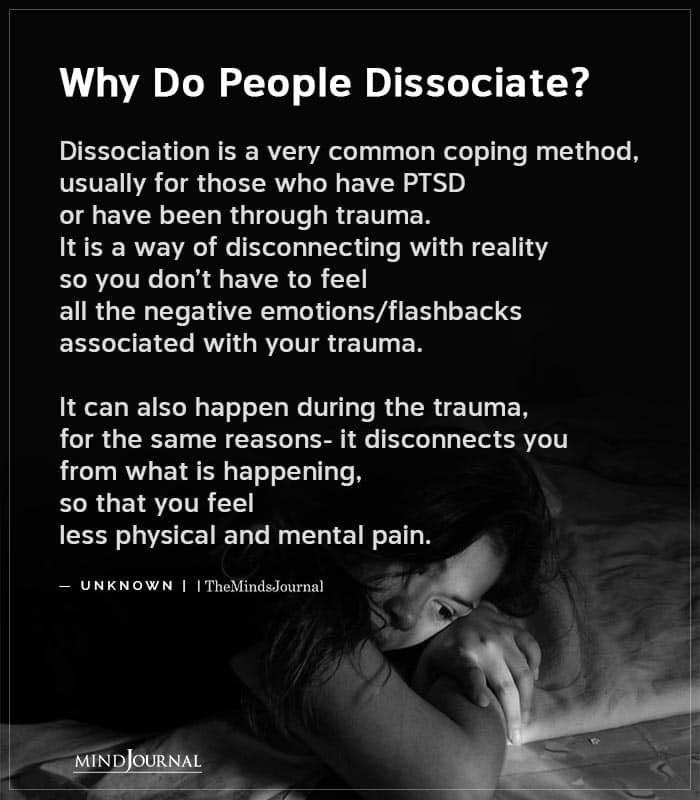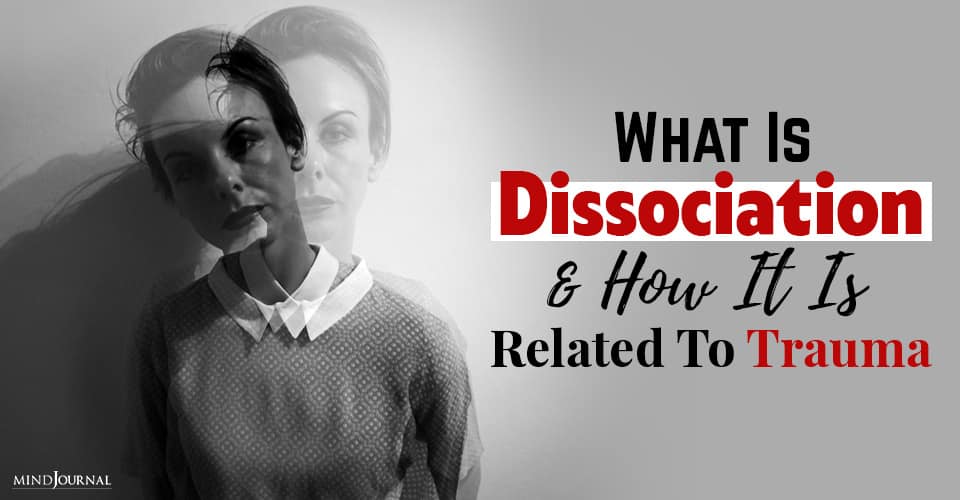Key Points: Dissociation can occur when someone is engaged in an absorbing or automatic activity and temporarily stops paying attention to their immediate environment. When some individuals face extreme stress, they may also disassociate, as a type of defense mechanism, although in these cases, it can lead to more serious concerns such as addiction and food disorders.
Dissociation, or detaching from reality, is a mental process that breaks connections among a person’s thoughts, memories, feelings, and actions. The dissociated parts of oneself (not me) have limited agency and lack of capacity to reflect. However, those emotions never go away. The unprocessed trauma builds up and often expresses itself through conflict with others (Howell and Itzkowitz, 2016).
Dissociation is a dimensional process existing along a continuum ranging from normal and relatively common everyday events (such as daydreaming) to severe and chronic pathology (such as dissociative disorders). Most of us have experienced dissociation that can result in disconnection from some of the reality that surrounds us. We become absorbed with some internal experiences such as driving (highway hypnosis), watching films, taking a shower, or jogging.
Related: Structural Dissociation: How Complex Trauma Causes A Split In Our Being
Dissociation happens because the person is engaged in an automatic activity and is not paying attention to his or her immediate environment.
Dissociation is a common symptom in traumatic stress reactions. The overwhelming force of traumatic events overpowers our existing coping mechanisms (Van der Kolk, 2014). For those unable to physically escape, dissociation provides a psychological exit from the horror of the traumatic event. Once the traumatic experience has been dissociated from the sense of “who one is,” it is no longer considered as a self-narrative.
For example, someone who was constantly belittled sarcastically by his father during childhood may have feelings of inadequacy and shame. These feelings could not be processed consciously.
Dissociation can also be described as a defense mechanism. Defense mechanisms are forms of emotional regulation strategies for avoiding (trying to forget) and minimizing emotions that are too difficult to tolerate (Schore, 2012). Defensive behavior plays a useful and necessary role in everyday life. People use these mental mechanisms to deal with disappointment, anxiety, anger, and other stressful emotions.

When people are feeling stressed, they often seek relief in dissociative activities that focus their mind on the present, and hence away from what is causing the stress, such as watching a movie, playing a computer game, or eating comfort foods.
Projection is another form of defensive behavior that protects us by attaching unacceptable feelings (or motives) to someone else (e.g., “You are the selfish, angry, or incapable one, not me.”). For example, a person who disowns the feeling of shame actively shames the mistakes of others. When we project our feelings onto another person, we empty out our own frightening emotions onto them.
Dissociation plays a crucial role in addictive behavior. The act of “getting high,” or “numbing” with addictive behaviors is dissociative. People with eating disorders use foods to quiet their internal conflict. However, repeated use of drugs/foods to gain relief can become life problems in themselves.
Related: Dissociative Identity Disorder: Everything You Need To Know About DID
Dissociated experience does not simply disappear quietly into some hidden corner of the mind. It is enacted. It will “play out” the state of self that one cannot tolerate experiencing directly—for example, slips of the tongue, in which a word suddenly intrudes into speech, seemingly coming from nowhere. One might engage in shoplifting to manage helplessness. Enactments are the only means of encountering dissociated aspects of the self.
The success of therapy and lasting change requires the person to come into contact with previously inaccessible aspects of those inner feelings. The way out of trauma is by going through it (Epstein, 1994).
Coming to terms with the overwhelming pain of one’s past liberates dissociated feelings, so the individual begins to know her or his mind. As we assimilate the unconscious into our conscious knowledge structures, we become who we are.
References:
Epstein S (1994). Integration of the cognitive and the psychodynamic unconscious, American Psychologist, 49, pp. 709-724. Howell, E. F. & Itzkowitz, S. , Eds. (2016),The Dissociative Mind in Psychoanalysis: Understanding and Working With Trauma. Routledge Press. Schore Allan A. (2012). The Science of the Art of Psychotherapy. New York: W.W. Norton & Company Van der Kolk, B. A. (2014). The body keeps the score: Brain, mind, and body in the healing of trauma. Viking.
Written By Shahram Heshmat
Originally Appeared In Psychology Today











Leave a Reply